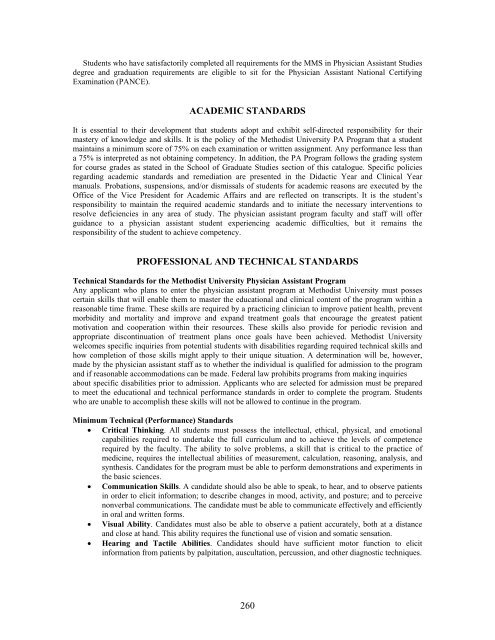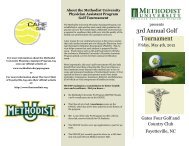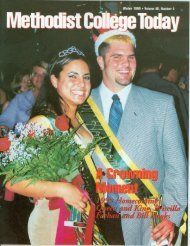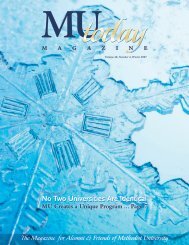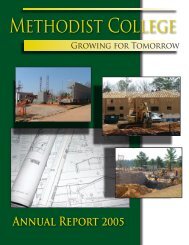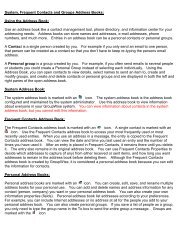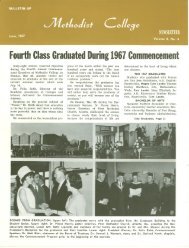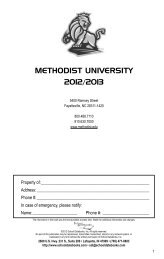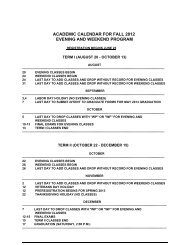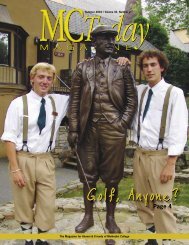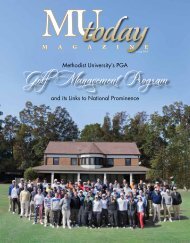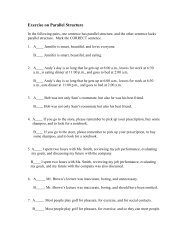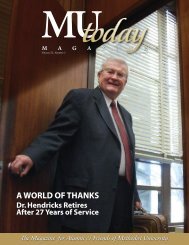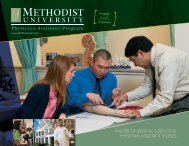Microsoft Word MU 2009-2010.doc - Methodist University
Microsoft Word MU 2009-2010.doc - Methodist University
Microsoft Word MU 2009-2010.doc - Methodist University
- No tags were found...
You also want an ePaper? Increase the reach of your titles
YUMPU automatically turns print PDFs into web optimized ePapers that Google loves.
Students who have satisfactorily completed all requirements for the MMS in Physician Assistant Studiesdegree and graduation requirements are eligible to sit for the Physician Assistant National CertifyingExamination (PANCE).Graduate StudiesACADEMIC STANDARDSIt is essential to their development that students adopt and exhibit self-directed responsibility for theirmastery of knowledge and skills. It is the policy of the <strong>Methodist</strong> <strong>University</strong> PA Program that a studentmaintains a minimum score of 75% on each examination or written assignment. Any performance less thana 75% is interpreted as not obtaining competency. In addition, the PA Program follows the grading systemfor course grades as stated in the School of Graduate Studies section of this catalogue. Specific policiesregarding academic standards and remediation are presented in the Didactic Year and Clinical Yearmanuals. Probations, suspensions, and/or dismissals of students for academic reasons are executed by theOffice of the Vice President for Academic Affairs and are reflected on transcripts. It is the student’sresponsibility to maintain the required academic standards and to initiate the necessary interventions toresolve deficiencies in any area of study. The physician assistant program faculty and staff will offerguidance to a physician assistant student experiencing academic difficulties, but it remains theresponsibility of the student to achieve competency.PROFESSIONAL AND TECHNICAL STANDARDSTechnical Standards for the <strong>Methodist</strong> <strong>University</strong> Physician Assistant ProgramAny applicant who plans to enter the physician assistant program at <strong>Methodist</strong> <strong>University</strong> must possescertain skills that will enable them to master the educational and clinical content of the program within areasonable time frame. These skills are required by a practicing clinician to improve patient health, preventmorbidity and mortality and improve and expand treatment goals that encourage the greatest patientmotivation and cooperation within their resources. These skills also provide for periodic revision andappropriate discontinuation of treatment plans once goals have been achieved. <strong>Methodist</strong> <strong>University</strong>welcomes specific inquiries from potential students with disabilities regarding required technical skills andhow completion of those skills might apply to their unique situation. A determination will be, however,made by the physician assistant staff as to whether the individual is qualified for admission to the programand if reasonable accommodations can be made. Federal law prohibits programs from making inquiriesabout specific disabilities prior to admission. Applicants who are selected for admission must be preparedto meet the educational and technical performance standards in order to complete the program. Studentswho are unable to accomplish these skills will not be allowed to continue in the program.Minimum Technical (Performance) Standards• Critical Thinking. All students must possess the intellectual, ethical, physical, and emotionalcapabilities required to undertake the full curriculum and to achieve the levels of competencerequired by the faculty. The ability to solve problems, a skill that is critical to the practice ofmedicine, requires the intellectual abilities of measurement, calculation, reasoning, analysis, andsynthesis. Candidates for the program must be able to perform demonstrations and experiments inthe basic sciences.• Communication Skills. A candidate should also be able to speak, to hear, and to observe patientsin order to elicit information; to describe changes in mood, activity, and posture; and to perceivenonverbal communications. The candidate must be able to communicate effectively and efficientlyin oral and written forms.• Visual Ability. Candidates must also be able to observe a patient accurately, both at a distanceand close at hand. This ability requires the functional use of vision and somatic sensation.• Hearing and Tactile Abilities. Candidates should have sufficient motor function to elicitinformation from patients by palpitation, auscultation, percussion, and other diagnostic techniques.260


